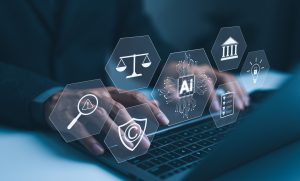With the recent big leaps in AI, virtually every industry is currently venturing into uncharted waters to evaluate the potential benefits (and pitfalls) of using AI within its niche. A concrete answer might seem especially hard to come by in traditionally conservative fields, such as legal practice. Still, some of the important figures already have a clear vision of using AI to the benefit of both lawyers and their clients.
Marek Krizka, Forbes Slovakia's recent "30 under 30", spent his whole professional life in the field of intellectual property. He is the CEO of the law firm Sparring, as well as the US Growth Lead and US Trademark Attorney at Trama, a trademark registration service. In this interview, Marek shares his views on what it takes to modernize legal services and why he thinks that lawyers won't draft documents themselves any longer in the not-so-distant future.
Marek, what does legal tech mean to you?
Our mission at both Sparring and Trama was always driven to innovate and employ tech within the law. What it means in practice is that every use of technology that can make legal services more effective, understandable for an outside person, and cheaper makes sense for us to explore. And that's what we are trying to do. We are trying to identify parts of legal services that can either be automated or made more effective, understandable, and cheaper.
And how do you think legal tech fits within the field of law? Do you feel it's welcome in the ecosystem?
Absolutely. The legal field, given how heavily regulated but also sensitive and highly impactful on people's lives it is, is very conservative and less prone to change than other industries. Even more than finance or banking, which were some of the most conservative ones.
But the field is moving slowly but surely towards change and implementation of tech because even small solutions can save tremendous amounts of resources and effort, and both governments and regulators are starting to see this. And so, I believe that the big move towards tech in law is inevitable. The industry as we know it will be transformed within the next couple of years.
Can you give an example of technological advancements already helping lawyers in their day-to-day lives?
Yeah, absolutely. I see it in new ways of document processing and drafting, in collaborative platforms where you can exchange documents and work on the assignments with your clients and counterparties, in the move towards online litigation and gathering of evidence, dispute resolution, etc.
Trama and Sparring and our relationship is a good example of this. We at Sparring are mostly a traditional law firm oriented at servicing tech companies, startups, and scale-ups, but we always look for new technologies to implement within our practice. When we see something that we, as a law firm, can't automate ourselves, we identify the opportunity, and we try to create a separate team that would work on it, not only from a legal but also from a technical point of view.
Then we create hybrid teams of lawyers and developers working together, automating the parts of the legal process we've identified, and then either implement them within the firm or spin them off as separate companies such as Trama.
And moving onward, where do you see the potential for the use of technology within the field of law?
In such a conservative industry, everywhere. The whole way of providing legal services should change. And by the end of the 2020s, hopefully, the law will move much more into the background. Meaning that you should have a very user-friendly front end without any legal documents at all, which will all be happening on the back end, powered by the tech.
A concrete example of this is that thanks to recent advancements in AI and large language models, I believe that within the next couple of years, transactional lawyers will stop drafting documents altogether.
So you imagine a world where an AI would do all legal writing?
Yes, I hope if the progress is fast enough, at a certain point, it will write our contracts and bigger pieces of legal writing. The lawyer will still be important to insert the right set of parameters into the model, do quality assurance, reread, adjust, and so on. So the element of human control over the result will be retained. Plus, the lawyer will still be essential to negotiate the terms and write a good term sheet on which the contract will be based.
Since you've mentioned large language models, are you currently evaluating them in your practice?
Yes, absolutely. I think that every law firm that wants to stay ahead of the game is currently looking at large language models and other tools and how they could be used to make lawyers' work more effective. And how to utilize them to produce answers and drafts faster and much cheaper for the client's benefit.
Let's move on to Sparring and Trama. Trama is currently filing around 500 trademark applications a month, much more than a traditional law firm would be doing. How can you handle so many orders?
Thanks to automation and the use of tech. Going back to my previous answers, the trademark registration process is a great example of a legal service that can be automated without sharing confidential business information.
In a traditional model, doing trademark registration at scale would make you uncompetitive. You can see in Trama's example that traditional law firms cannot compete with it because of the sheer amount of human workforce that is necessary in a traditional model.
How do you then make sure to keep the quality of the service?
This is a very important point. At the end of the day, client happiness is our main goal, scaling without client satisfaction doesn't get you far.
To keep a client-oriented approach, you have to hire the right mix of people. You need very good lawyers and also technologists and developers who can put the solution into practice. I think that it's like with any other business; success lies in the quality of the team. As long as we can keep the pace of growth of both our people and the business itself, the quality will be there. And so far, our track record shows that it's possible.
What would you say it takes to apply this very startup-like scaling to legal services?
Different mindsets, very different mindsets. Usually, attorneys think in a very safe way because legal services, at the end of the day, should provide our clients with certainty and safety. And so, most of the attorneys, frankly speaking, are not good entrepreneurs. Being an attorney doesn't automatically mean you have that entrepreneurial spirit and want to move fast, disrupt things, and scale.
On the contrary, a typical lawyer wants to do things safely and protectively, which usually results in very little or no development. So I would say that both Sparring and Trama are startups first in their mindset and the way we do things, and law firms second.
You've already mentioned that at Sparring, you're focusing on tech firms specifically. Why such a niche focus?
The answer is twofold here. The first driver is external - our narrow focus helps us to keep the quality, as I've mentioned before. It allows us to have deeper inside knowledge of the companies we serve and be able to serve them better. So by only servicing these firms, we not only have a better shared common knowledge, but we try to collect as much industry insight as possible. So we are not legal-practice-centric, but industry-centric.
And the second is coming from within. The type of mindset I mentioned before, the entrepreneurial mindset of quick growth and disruption, we share with our clients, which helps us to serve them better.
As a closer, if you could give one piece of advice to law students interested in IP, what would it be?
Spread your wings wide. Do not focus solely on the law. Pursue what you like to do. And if that's IP, then you should be genuinely interested in following trends in technology. You should follow where the tech is going. Then, the law will come naturally as a second strength that you can combine with technology in the area of intellectual property. So I would say at the beginning of your career, do a wide range of activities in the field of tech and meet with not only lawyers but other professionals who work in the field, software guys, product managers, entrepreneurs, startup founders, and so on. As an IP lawyer, you will fit nicely into this bubble of technological evangelists.





















